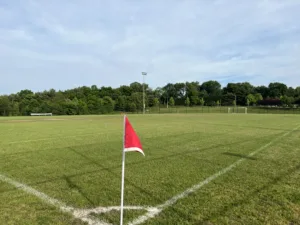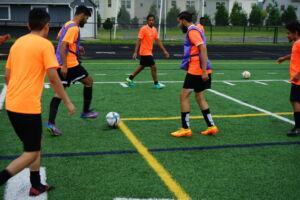How to Craft the Ultimate Playing CV for Aspiring Soccer Players
Whether you’re a high school athlete looking for a college scholarship or an emerging talent hoping to catch the eye of professional scouts, crafting a compelling Playing CV or resumé is crucial.
In today’s competitive landscape, you need to stand out both on and off the field, and a well-prepared CV can help you do just that. In this blog post, we’ll offer a comprehensive, step-by-step guide on creating a Playing CV that covers all the essential elements and then dives deep into the nuances that could make you an irresistible prospect.
Tools You'll Need
- Word Processor: Microsoft Word, Google Docs, or other reliable software.
- High-quality Camera: For headshots and highlight videos (optional but recommended).
- Spreadsheet Software: For tracking statistics (also optional but helpful).
Choose the Right Software: Opt for word processing software that exports your document into a PDF. The PDF file type ensures the formatting remains consistent across different platforms.
Design and Layout: Pick a clean, straightforward template that’s easy on the eyes. The CV should ideally be limited to one or two pages to ensure that the reader remains engaged.
Step by Step Guide to Create a Player CV
Personal Information
- Full Name
- Position: (Goalkeeper, Midfielder, etc.)
- Date of Birth
- Contact Information: Email and Phone Number
- Nationality
- High-quality Headshot: Invest in a professional-looking, clear, and recent photo.
- Social Media Links: Include professional profiles that showcase your soccer involvement.
Objective Statement
The Objective Statement is the introduction to your CV or resumé. Your objective statement should reflect your soccer career goals. Are you aiming for a professional contract or a collegiate scholarship? Make that clear in 2–3 crisp sentences.
Playing History
Current Team: State your name, league, position, and unique responsibilities like captaincy.
Past Teams: Names, levels (youth, club, junior varsity, varsity, semi-pro, pro, etc.), tenure.
Achievements: Any awards or standout performances, quantified where possible.
For example, "Scored 15 goals during the 2023-2024 season, leading the team in scoring."
Soccer Skills
Technical Skills: Rate your skills, like dribbling, shooting, etc., on a scale or use descriptors like "excellent," "good," and "average."
Tactical Awareness: Cite instances where your understanding of the game made a significant impact.
Physical Attributes: Speed, endurance, and strength. Use standardized test results, if available, to quantify these skills.
Education
Current Education Level: Include your most recent educational level. If targeting colleges, mention that transcripts are available upon request.
Honors and Awards: List any academic accolades.
SAT/ACT Scores: Include these if they strengthen your profile, demonstrating a balance of academics and sports.
Extracurricular Activities: Mention any other sports or activities you are involved in, especially those that demonstrate teamwork, leadership, or other transferable skills.
Professional References
Coaches: Past and present.
Teachers or Academic Advisors: This is especially useful if you aim for a college scholarship.
Others: Family friends who are familiar with your soccer career can also serve as references. Always get their permission and explain how they know you.
Highlight Video
- Keep the video length between 5-7 minutes, ensuring it showcases a range of skills relevant to your playing position
- Use narration or text overlays to highlight where you are on the field during critical moments
Optional Extras
Game Statistics: Use charts or tables for easy readability.
Fitness Test Results: Standardized tests can provide verifiable data on your physical capabilities.
Final Touches
- Scrutinize your CV for grammatical errors or factual inconsistencies
- Obtain feedback from coaches, teammates, or mentors to ensure you haven’t overlooked anything important
- Save the file in professional formats like .pdf
- Use a professional file naming convention, like "FirstName_LastName_SoccerCV"
Sending Out Your CV
Following this extensive guide, you can compile a Playing CV highlighting your achievements and emphasizing your potential as an aspiring soccer player.
- Send your CV to prospective teams, colleges, or scouts with a professional cover email.
- A polite follow-up email is advised if you have not heard back within two weeks.
Remember, the key lies in the details.
Tailoring your CV to reflect your soccer-specific skills and broader attributes can make all the difference in capturing the attention of those who hold the keys to your future in the sport.









